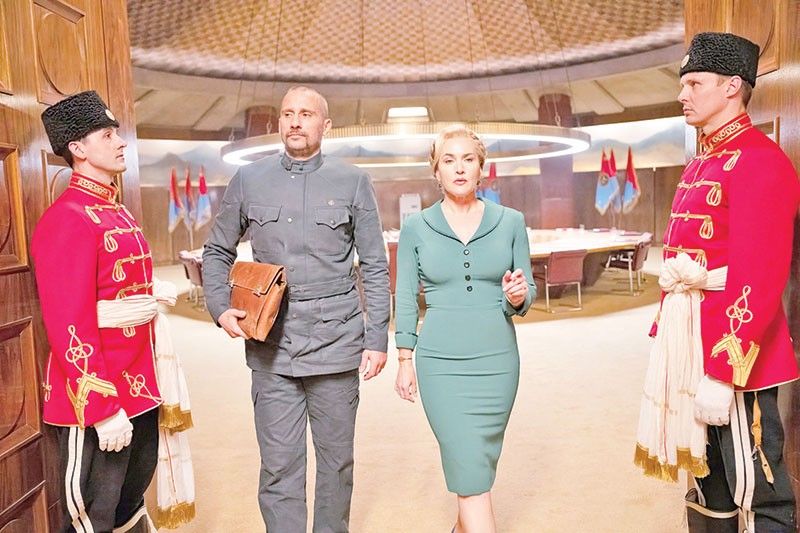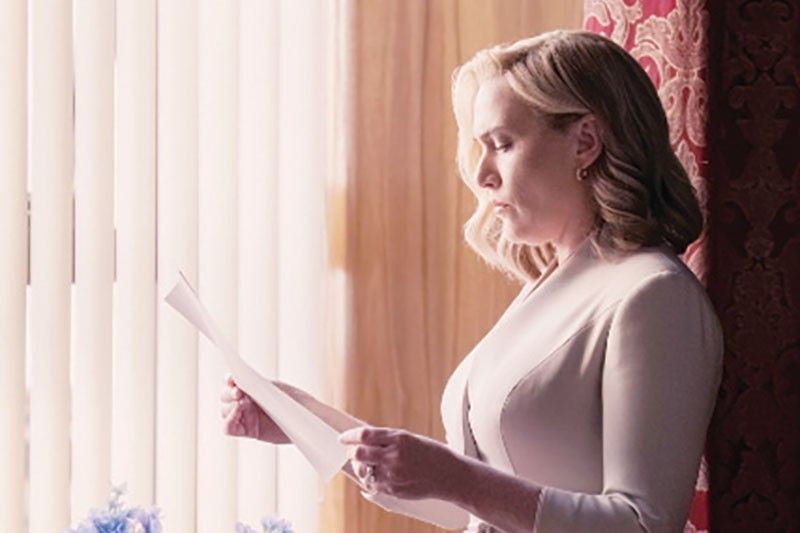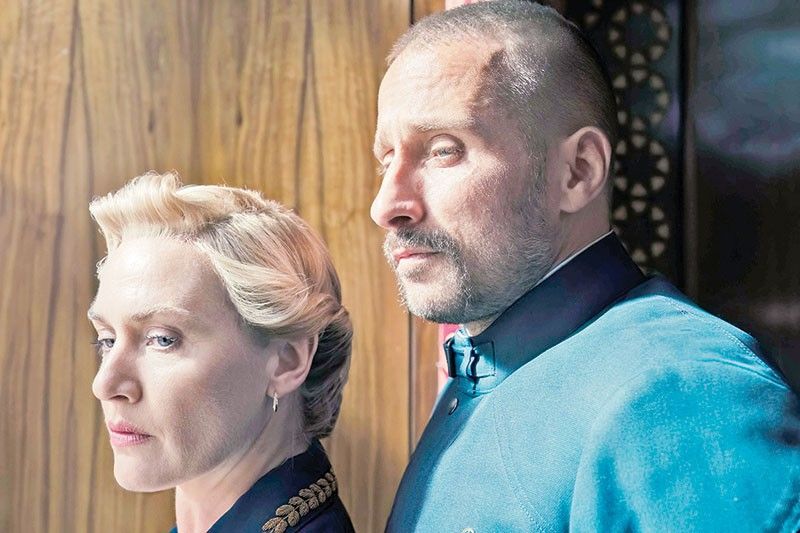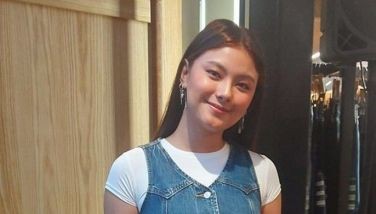‘Succession’ producer explores dangers of power and toxic love in dark comedy ‘The Regime’

“The Regime,” a forthcoming HBO series produced by Will Tracy of “Succession” fame, is a dark comedy delving into themes of power, authoritarianism, and toxic relationships.
The show depicts life within the walls of a modern authoritarian regime as it crumbles, as per synopsis. Oscar-winning Kate Winslet stars as Chancellor Elena Vernham, an increasingly paranoid and unstable populist leader in a European nation, who finds solace in Herbert Zubak (Matthias Schoenaerts), a volatile soldier turned confidant and lover.
“It’s a twisted love story about two people who should never have fallen in love,” Kate said in the production notes. “But it’s also a geopolitical satire where, at times, nothing makes sense at all and things that happen are so absurd all you can do is laugh your head off.”
According to showrunner Will Tracy (best-known as writer/producer for the American horror-comedy “The Menu” and Emmy-winning HBO drama “Succession”), “The Regime” was inspired by his bedside reading material about autocracies, authoritarian leaders and totalitarian states.

“I’m fascinated by those people who are insulated or isolated and within that bubble they can do anything they want; they can create any version of reality or truth that they want and there’s no one there who is going to tell them that two plus two doesn’t equal elephant,” he said.
“I thought it was a good place to start with a character who has basically unlimited power and resources but is limited in some ways or broken in terms of their psyche.”
While Will studied real political leaders for “The Regime,” he noted that the central character of Elena is her “own woman and entirely a work of fiction.”
“Half the fun of the show for me was creating my own country and imagining a very specific type of speculative 21st century leader. I tried to use the research judiciously, which freed my imagination and also prevented me from feeling as though I had to carry any water for another country, historically speaking.”

The STAR recently joined a virtual roundtable chat with Will to discuss “The Regime.” He shared, among other things, why he offered a darkly humorous take on a serious subject matter when he could have turned the show into a “straight” thriller and serious commentary on the dangers of authoritarianism and too much power. Below are excerpts.
If we can set aside countries, geopolitics and all of those things, what is the essence of what you’re trying to tell in this story? Why does mental health seem to sit kind of right in the middle of it?
“The show is maybe about the intersection of the personal and political, then maybe it is about somewhat of the intersection of mental health and geopolitics, in that sense.
“I think of the show as a bit of a love story. It’s not a love story the way that ‘The Notebook’ is a love story. Not that kind of romantic love story, but it’s kind of its own toxic love story nonetheless.
“Like any love story, it’s about two people who are, in different ways, a bit broken, who are trying to make each other become the best versions of themselves. Maybe for brief glimmers of the show, you see that happen. You see them fill in those gaps in the other’s personality or pick up the slack for them in terms of their mental health struggles for moments there until maybe their own damage, selfishness or sense of self-preservation gets in the way.
“Unfortunately, the ways in which they’re broken are so diametrically opposed. (Elena), in addition to the kind of wiring her childhood and the parenting that she had gave her, the unlimited power and fame and isolation of being that type of leader, I think, do poison your brain to a certain extent.
“The character of Zubak is very much a product of the system, a man abused by the system that (Elena) created. So, it’s very hard to make those two meet in any way that feels equitable, which is what you kind of need in a successful and healthy relationship.
“The challenge was how do we tell the story of that relationship in parallel to the relationship between this leader and all of her people, the entire country, also with foreign powers who make her feel insecure and patronized in a sense.
“That intersection between psychological and political, and the very small, personal and intimate and the big geopolitical stakes, is right at the heart of the show.”
“The Menu” and “Succession” are both incredible. They walk such a good line of comedy and politics, much like in “The Regime.” How do you tread that line?
“I come from a comedy background. That’s where I started my career. In some ways, despite my best efforts, I seem unable to leave it. Even when I try to write something — OK, I’m going to sit down and finally, write something not comedic — it just ends up coming through, which I think, ultimately, is for the better. I would probably be quite dismayed if I saw what my very serious attempt at serious writing will actually look like.
“It always helps a show to have a flavor of humor to it. In terms of this specific show, it was sort of unavoidable. When you’re dealing with this type of world and a character that extreme, with that unlimited power and who’s that isolated, it becomes very hard for it not to have a flavor of absurdism to it. Because she can say or believe anything she wants, create her own reality, and everyone around her has to agree that ‘Yep, the sky is green.’ Everyone has to kind of fall in lock step behind whatever she’s believing that day or story she’s telling herself.
“That, to me, is just inherently funny. There are points where you do have to pull back on jokes and punchlines because…first of all, you want to treat this subject matter — oppression and authoritarianism — with the seriousness and the danger it deserves.
“But also, you don’t want to force the comedy too much or find a point on it if you kind of play it real, play it straight, and play it dry and kind of icy. Then the comedy will find itself and come even, hopefully, more funny because it’s more horrifying and more real.
“You’re not necessarily given the chance to relax and say, oh, this is just kind of a pantomime of a dictatorship. It’s no, these people kind of did their homework and this feels real and the stakes here feel real and I’m a bit scared, and hopefully make people laugh even more. That’s the hope, at least.”
Can you walk us through the casting process, especially having Kate to play Elena? She also mentioned that this is her return to comedy after a long time.
“The show now just feels inconceivable without Kate. I’m not sure exactly what we would have done had Kate not been interested in it. I’m trying to even remember who our other options were, or who was on our dream wish list.
“She just seems so right for it. I think you just need somebody who not only has the capacity for comedy, which I never was in any doubt about. It is mentioned sometimes that she doesn’t do a lot of comedy. It might be true if I go through her filmography but it never seems to track in my head.
“I’ve always kind of been aware of her as being funny in things that are not necessarily even funny films, that she brings a humor to them, that she has shades of that kind of ability to be light and funny and acerbic. That she brings that to even her more squarely dramatic roles. I was never too worried about that.
“It was a tall order to find somebody who could realistically not only handle the comedy and the drama but have this kind of emotional openness and vulnerability, even when she’s playing a horrific person at times. That she’s able to still… We can see, oh, the cracks in the filament. We can see how she’s damaged and even have a certain degree of empathy for that damage. Also she would have the power, the magnetism to be really convincing as a head of state. She just had all those qualities.
“I could go through the whole cast, but in terms of Matthias, it was sometimes an even taller order because we needed somebody who could not only handle the tonal stuff that I just mentioned, but also could have a true, imposing physical quality, which you don’t always get.
“Honestly, I didn’t want to have to fake it where we just put some guy on a couple of apple crates and pretend he’s a giant. I really wanted someone who could walk into a room and you’d feel (him). That’s what he has and that’s just one of the things he has.
“As hulking and physical as Matthias is, within a millisecond, this beast, this huge edifice can become like a vulnerable little boy. He’s so dexterous verbally but he needs to convey, especially in the early episodes where he’s more of an observer… he’s such a non-verbal character, but he needs to convey so much with his face and Matthias’ face just contains multitudes.
“He also gave the show, I have to say, a much-needed dose of — for lack of a better word — a kind of Europeanness right into what is a largely British cast. He has this feeling of the continent and he could have come maybe from any part (of Europe).
“He’s Belgian but you wouldn’t necessarily know that if you’re watching the show. He also has a timeless quality to him. He feels somehow old world. He brought all of that to the role in a way that it’s now equally impossible to imagine the show with someone other than him.”
“The Regime” premieres on March 4 on HBO and HBO GO.
- Latest
- Trending




















 Exclusive
Exclusive







